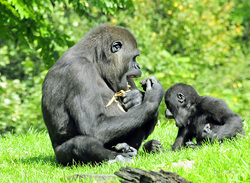
Primates' family group structure, social groups, death and grieving behaviors, "child"-rearing, problem-solving competence, communication and expressions of affection suggest that there's a "lot more going on" here than just monkeying around (ba-da boom!).
For me, one of the most fascinating aspects of their social structure occurs when males orangutans, apes, gorillas, monkeys, chimpanzees (not gibbons), achieve sexual maturity and the elder females in the group (the grandmas) break branches off the trees, beat them on their backs until they drive them out of the family group.
Why? Because grandma knows that those randy boys will "take" any willing female regardless of their biological relationship. The "boys" have no sense because their biological urges are in charge. Grandmas drive them out of the family to give them a chance to explore the forest and mate with females from other families, thus protecting the robustness of the gene pool. Ever see an "in-bred" monkey? That's because they "know" better...at least grandma does. Whereas over the course of our history, we've passed laws about incest, primates "know stuff" and they forbid it. [Let me say right here that I have this "mind movie" where two male teenage gorillas pass each other in the forest and 'high five' each other as they make their way toward the girls. Ha!]
Whatever can we learn from gorillas, you say? Actually, we can learn a lot. We can better understand the behavior of our teenagers because we appreciate the biology that drives their behavior without the "overlay" of culture. Primates have shown us that biology without the influence of culture.
Yep, your teenager wants to get out there and mate. That's what their biology drives them to do. But, first, they have to pass algebra. Ha! Oh, the frustration and conflict. You, Mom and Dad, are in the way. Long about the 5th grade, when many kids are 10 years old, their bodies begin the process of becoming sexual (and, I hear parents hyperventilating right now...don't lie, your heartbeat has quickened, has it not?) You may not see breast buds or pubic/underarm/facial hair, but trust me, "stuff" is going on in there.
I frequently say that "Life is an inside out job". Just like cake. Yes, cake. It may "look done" on the outside, but stick a toothpick in it and you know it's gotta go back in for another 5 minutes. Kids begin maturing on the inside before you see signs on the outside. And, before you even seen the physical signs of maturation, you will see the behavior that signals on the onset of adolescence. Hold on, here it comes!
Starting at about the age of 10, you'll get "pushback" on helping them with homework. They begin to tell you that they don't want to "hang" with the family and overall, you get the feeling that they are "cheating" on you. Yes, they are! They are now hanging out with the other gorillas.
They will argue about every single little tiny thing in the universe as they joust for position and control. Make no mistake about it, they are coming for your power! This "much ado about everything over nothing" are labor pains.
Remember how I said in a previous post that adolescence is a time when they are giving birth to the adult inside them? It takes about 6-7 years and you've got no anesthesiologist, no comforting obstetrician encouraging you and no glowing, nurturing team of nurses who tell you that you are doing "just great!" You believed them! Oh yes, you did! Why?
Because they are seasoned professionals and we "rent" their confidence in us and we really don't want to disappoint them, so we hunker down and deal with one more grinding contraction or one more "big push". But now, that baby is a teenager and you are hanging out here all by yourselves. Who is going to cheer you on and answer your questions now? It's time for you to learn some basic information and develop coping skills.
Hopefully, as a mother, you didn't resent the birthing process because you knew it was nature's way and you were prepared by your doctor for the process ahead. [OK, admit it, we did make some fairly ugly comments to father!] The labor and delivery of the adult is called adolescence. DO NOT take this process personally. Just like you did not take it personally the first time when it was a physical process, don't take it personally now that it is a social-emotional process.
Teen's contrariness, their fierce fight for independence, their distancing themselves from you qualifies as the "labor" part of the process. The "delivery" will be marked by them going to college or out on their own. Pop open that champagne, Mom and Dad, you've just launched (delivered) a 18-year old sub-adult out into the world!
One of the biggest challenges that parents face is the sudden and terrifying realization that childhood is over and now, we're in "transition labor" (that's the really tough stage, incidentally) and it's gonna be a long, long, long, long time before it's over. However, many parents, in my experience, somehow do not notice that their "baby" is now 13 years old and is hell-bent on getting away from them. Their fierceness is a positive sign (I get really worried, as a clinician, when I don't see at least some "pushback"). It's nature's way. Follow their lead!
Help them to use their new-found freedom and skills (the development of higher order reasoning, etc.) to practice their "sub-adult" skills.
Give them healthy opportunities to "get out there" where they can take "baby steps" and make "baby-step" mistakes. Of course, you are mentoring them along the way, right? I am using and emphasize the word mentoring intentionally. NO hovering, NO nagging...you are a resource and "supporter-in-chief", but your goal is to get your kid out the door to become a competent adult, a self-sufficient, tax-paying citizen who IS NOT living with you when they are 25 years old.
Just let me say right here that there is no "hard and fast" time frame for this process. Some kids are late bloomers, so don't throw them in the deep end of the pool and do not communicate to them that they will "never" get to where they are going.
If they are not ready to drive or date, avoid making them feel different or comparing them to others who are "ready" for the adult skills. Also, from my experience, kids with ADHD, sensory issues, learning disabilities and other developmental disorders are not "fired up" to get out there and drive. It's as if they "know" they are not ready.
Research tells us that kids with ADHD lag behind their peers socially + emotionally anywhere from 30-50%, so don't push, but be available, supportive and encouraging. Do NOT coddle! Do not make excuses or feel sorry for them. This is THEIR path, not yours. They will just have to take it more slowly and need more practice before they are comfortable. Be grateful that they "know their limitations" (it's my "Clint Eastwood approach" to parenting).
Babies are born when they are ready. Now, we know that the "due date" concept can be all wrong as many babies are born healthy up to 5 weeks +/- the calculated due date. So much for formulas. Kids achieve language and motor skills generally within a "wide" time frame and end up without any difficulties.
But, research suggests that boys who mature early and girls who mature late have the least challenges. Boys who mature early experience less bullying, are given more leadership opportunities and are generally seen as more capable and desirable. Later maturing girls have an opportunity to develop their social and academic goals and begin pursuing their personal goals because they are not distracted by the gorillas who are drawn to their pronounced physical attributes.
Boys who mature later are not "lost" by any means, but may find the teen years to be more of a challenge than other boys.
The early maturing girls who are more physically mature attract the randy gorillas and while they possess the "va-va-va-voom" factor, they do not have the robust executive functioning competence (social judgment, impulse control, forethought and planning skills) that allow them to fully consider the consequences of their behavior. Oops, the stick is blue...
In reality, the later maturing boys and girls may actually avoid some of the "life-altering" and impulsive pitfalls of adolescence because they are not as desirable as their peers. They are out of the loop and doing their own "thing".
Raising kids involves way too much luck for my tolerance. It's a crap shoot and family values need to be ingrained before teens get to the point where they are both fertile and mobile. (Now, this is the point where parents really start to hyperventilate..."My baby having sex! Oh the humanity!")
A fertile teen with an underdeveloped prefrontal cortex (area behind the forehead) where the executive functioning skills are housed is like giving a 10-year old a loaded gun. They've got the "goods" but no judgment as to how to use them.
The prefrontal cortex doesn't finish maturing until somewhere between the late 20's and early 30s. Start preparing kids for adolescence when they are 10-ish years old and they have a better chance of meeting the demands of each age until their brains are matured enough to use them consistently and reliably.
IDIOT ALERT. Somebody is going to say, "Well, he's not responsible for shooting that father of 4 because he's only 21 years old and his brain isn't mature". NOT. The age of reason begins at about 6 and refines through adolescence (see Kohlberg's theories of moral development). If you can't control your impulses and you do damage to someone, you need to go to jail to protect the rest of us from you. Case absolutely closed. Shut the cell door. Buh-bye...
So, let me step down from my "neuro-soap box" and continue with the "how-to and why". My hints:
- Start early with the "dos and don'ts" of your family. "The Smith family does not use drugs (not be confused with medication...call it what it is!] We are honest with each other and work through our disagreements. We work together so that everyone can get at least a little of what they want, but always get what they need". I'll be talking about developing Family Mission Statements in another post, but for now, this is a good start.
- Lay out "what" your family is all about. "We're here to care about and respect and learn from each other." Love does not have to be part of the equation. Have you ever had someone "love" you and then, treat you like crap? Exactly, WHAT does love mean anyway? I'll tell you...care, consideration, respect, cooperation...yeah, like that.
- Confidently state your values and expectations. Three or four is the LIMIT! Master those and then swap them out for others and your kids mature.
Why do this? Because your kids can't plug in a crystal ball and read your mind. Let them "rent" your commitment to your values by reinforcing them frequently (see #1 and #2 above). If you tell them "enough times", they will internalize your message and your code will become their code. They'll be ready when someone hands them a tab of LSD and says, "Here, try this. It's cool. You'll feel great. We're all doing it". You wouldn't suspect it, but kids will "own" your values while adopting the behaviors and preferences of the other gorillas. Be careful about the values you demonstrate. They are watching us; let's avoid being hypocrites, shall we?
- If you maintain the "I'm the boss of you" mentality, you're done AND you will lose. If you don't develop substantial negotiating skills, just hand your kid over to someone else right now. I can't help but recall that incredibly fun show, the original "Let's Make a Deal". Monty Hall pulled people wearing banana costumes out of the audience and tempted them with "deals" behind three doors was just plain funny. However, Monty knew how to negotiate and he did not get all crazy about it and caught up in the emotions. It was a deal mutually agreed-upon by both parties.
- Don't take their drama personally. Treat them like anybody else who is acting out on the street. Walk around them and move on. Have you ever seen cops trying to get someone under control? They continually and calmly repeat, "Put your hands on the hood, sir. Put your hands on the hood". They don't respond to the drama.
Wait a second! WHY should I do that? Because of the way their bodies are evolving, that's why. Don't accept any kind of abuse, but know when to pick your battles. There's not enough time in the day to react to every incident of "rude-tude". Rude attitudes, irritability, and emotional reactivity are expected to some degree or another. You see, they've never had to straddle this particular see-saw before. They run from one end to the other keeping up with social, physical and emotional changes and oh yeah, study for the history test and write the science paper.
Practically every day, they wake up with a different body and brain. That's just how chaotic it is in there. Boys' pituitary glands dump growth hormones between 2 and 6 a.m. Their bodies are growing dramatically during this time, so they are not resting. Girls are on a more predictable schedule once menarche is achieved, but they, too, are in the "fast lane" of growth. This rapid growth leads to crankiness. Let your teen sleep late on the weekend. They are not being lazy (as long as they weren't playing video games all night), they are growing. At least 12 states have pushed back starting times for high schools because kids were sleeping in class, oversleeping at home or were obviously "not there" due to sleep issues. Plus, they have tons of homework that keeps them up very late working under stress.
When boys metabolize their hormones, the "toxic waste" is excreted through their scalps, underarms, and oh yeah, the soles of their feet. The stuff in those socks could be weaponized. If they have a sour scalp or just stink, in general, you may not want to say anything and just let the other "gorillas" comment on their smell. If you choose to bring this to their attention, you might consider (and I might be kidding about this, but I'm not sure)...
- "You might not be aware that you could smell fresher."
- "Toxic waste dumps smell better than you."
- "Could you stand downwind from me, please?"...pick your poison because you will have some kind of reaction....
If they blow you off, let their peer group (gorillas) socialize them. A woman called me for advice (her friend's child had worked with me). She had exactly this complaint. My advice? Let his peer group socialize him. But, she was afraid he'd be embarrassed. "Oh well", I said, "Natural consequences. That's the price he has to pay for not working with you on this." I went on to tell her that some gorgeous girl will walk by and say, "Dude, you stink" and it will be "on". I told her that she will be spending upwards of $100 on hair products, body washes, deodorant and colognes. She was skeptical. Several weeks later, she left me a hilarious message and said that she can't get him out of the shower. I kept the message for a while...sanity check. Life can be funny.
- Please, please get a sense of humor. Make fun of yourself (but not them) and let them know you are a PUC...yes, a PUC...a parent under construction. Even if you have parented another teen child, you haven't parented this one through adolescence yet, so there's more to learn. And, yes, your kid is also a PUC...a person under construction. Don't let Dad try to go with Father under construction...ahh, no. He's got to be a DUC (giggle).
- You can be self-deprecating and honest about your shortcomings and inexperience as a parent. Phrases such as "OK, let's re-do this. We're not getting anywhere and I'm new at this with you. Be patient and give me some suggestions as to what we can do to work this out." Life is a team sport. We all play our positions. Get up, suit up and show up. Be prepared. Language such as the statement above (and you know I am big into language), results in a NO harm, No foul, NO blame approach, just the truth.
WHY IS THIS LIKE THIS NOW? Many of these family dynamics are relatively new to our culture. First, we've given our kids permission to have feelings and to have a voice. Those of us who grew up with World War II vets as parents generally were allowed to feel happy or angry. That's it. After what our (usually) fathers saw on the beaches of Normandy, you didn't get to be disappointed or sad or frustrated or confused or bored or whatever or you'd get "the LOOK".
Second, we moved off the farm to the big city. When we were a primarily agrarian-based (farming and such) society, we did not have the "luxury" of all of this "storm and stress". At much younger ages, kids could get up and go and find their own way. Many had families and farms and herds of cattle in their early 20s. We may be holding our kids too close for too long. The ancient brain is fueling those biological drives and saying "Get away, get away" and we're in their faces saying, "No, stay, you've got to graduate high school and go to college". The 1800s and 1900s apprenticeships have given way to formal and mandated education. Perhaps this is not for the better because biology has not caught up with social norms.
In the 1800's, you might have sent your sons to my ranch to learn cattleman's skills from my husband and sons. Along, the way, my husband would teach them his values and philosophies of what it means to be a man and the lessons he learned from his mistakes. I would send my daughters to you to learn your canning and baking secrets and along the way, they would have learned your values and philosophies and experiences as a woman. The "back and forth" created a wealth of information and reinforced the "code".
Now, our trust in other adults has been severely eroded by the pathology of a relatively few adults in our society. We no longer blindly trust Scout leaders, priests, rabbis, ministers, Little League or swim or gym coaches, Sunday school teachers, camp counselors or even neighbors because we just can't live with the consequences of our children being harmed. We have little faith in the legal system to apprehend and bring predators to justice. Our children have begun identifying with the "small" and "big" screen "heroes" instead of having their own live models in their communities. Changes in society will take place when there are changes within the family. We can do better.
I believe that these are some of the reasons why substance use increases from age 11 with an average of first use at age 14. Drinking is now being reported in children as young as 10 years old with an average age of drinking at15.5 years. The average age of first intercourse was 15 with the greatest risk of HIV, sexually transmitted diseases and unwanted pregnancy between 15 and 19. (statistics taken from Beyond Storm and Stress by Hollenstein and Lougheed, September, 2013 American Psychologist which is the journal of the American Psychological Association). Scary.
I was an elementary education major at the University of Florida when I traveled to Washington, DC for a conference in education and happened to be seated at the same table as Margaret Mead. I was surprised at the interest she showed in my life and my goals. Those few moments spent in her presence profoundly impacted me. When I think of her quote, "Never doubt that a small group of thoughtful, committed citizens can change the world, indeed, it's the only thing that ever has", I am convinced social change starts within our families.
I encourage you to look at your teenagers differently. Think about the gorilla mothers in the jungles, who, at this very moment, face their own challenges. They are confident and wise. We can be, too.
TTFN, Claudia
Join me on Facebook at Dr. Claudia McCulloch
At drclaudia.net, click the "Ask Me" button to submit a question!






